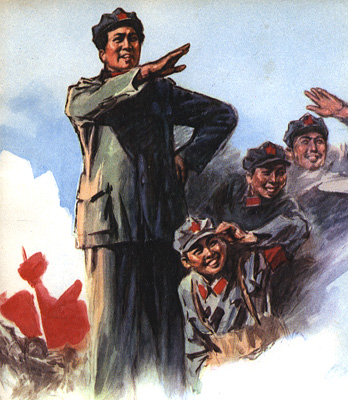Why born? Why live? And why die?
Kaithirasen, columnist from NST, commented on joy that a baby brings along upon her arrival on New Sunday Times of 26 Mar 2006. Perhaps, I should call this is a tacit agreement, for today is my 19th birthday. The commentary has somehow makes me visualise myself being born and wailing but doctor, nurses and, especially, my parents were smiling. Since that moment, I have also become hope of my parents and even the human beings.
Zillions people come to the world as I did and they are also the hopes of human beings. Before the age of 5, they learn. Somes are fast while somes are slow. Later in their from 5 to 20, fortunate ones get the chance to discover more in the world. However, many are not so fortunate. They have to find different ways to survive in very harsh and unpredictable condition. These people, despite hardship and sufferring they are encountering, do not give up to continue the line of human beings. What makes them persevere? Is it survival instinct? Or is it the prospect of happiness in future?
I do not know the answer but I know that I am the fortunate one. So are the people around me. They have learnt a lot although the amount of knowledge they acquired is insignificant in the universe. The capable fews from this group of people later use their discoveries to invent, design and create to benefit others in their communities but the unfortunate ones are still left behind.
Therefore, fews form the benefited communities feel obligated to help. Whether the aid is in the form of food, money or in more constructive form of education and technology, little can be done to improve on the "unfortunate" condition that lies onto them. It is because they did not teach them how to create as the capable fews did. Instead, they give them whatever has been created, which is useless to alleviate their suffering permanently. Nevertheless, they are not to be blamed because know-how to create is not a textbook knowlegde that can be passed down. Thus, the fortunates one remain unfortunate.
Whether being fortunate or not, no one can avoid to face the menace of death. And after they pass away, it leaves nothing but memory and, perhaps, their creation.
So what for living if one has to die eventually?
I have been searching for the answer but to no avail.
Bodhisattva, teacher of buddhism, had concentrated his energy to look for the answer 2000 years ago. He said life is impermanent as it is in the cycle of being born, old, sick and die, which is a form of suffering. The world we are living now is for us to acquire prajna (Wisdom to realise the emptiness of the materialistic world), hence to be able to cross to paramitra (to cross beyond all suffering and difficulity).
This is quite true because most our suffering is caused by sights, sounds, smells, tastes, body and mind. Should we overcome limitation of our body, we will have no suffering. Notwithstandingly, I have a doubt - if human beings are born to realise the emptiness of the world, why give place us in the cycle? In the cycle, we suffer and forget about the lesson learnt from the suffering after we die. Thus, we are born and make the same mistakes again. Why?
I am in a state of confusion. I want my family to live in happiness but money is the only possible mean to achieve happiness for people around me in this society. Such illusion is possessed by most of the people around me. This is because money can buy you health, buy you time, and most importantly, help you to pursue your interest and your happiness.
Thus, it is difficult for me exclude financial factors when I plan for my future if I want to be happy most of the time. I do not hope that people will cry when I am dead and smiling, but everyone on the earth can be happy in their short span of life.
Zillions people come to the world as I did and they are also the hopes of human beings. Before the age of 5, they learn. Somes are fast while somes are slow. Later in their from 5 to 20, fortunate ones get the chance to discover more in the world. However, many are not so fortunate. They have to find different ways to survive in very harsh and unpredictable condition. These people, despite hardship and sufferring they are encountering, do not give up to continue the line of human beings. What makes them persevere? Is it survival instinct? Or is it the prospect of happiness in future?
I do not know the answer but I know that I am the fortunate one. So are the people around me. They have learnt a lot although the amount of knowledge they acquired is insignificant in the universe. The capable fews from this group of people later use their discoveries to invent, design and create to benefit others in their communities but the unfortunate ones are still left behind.
Therefore, fews form the benefited communities feel obligated to help. Whether the aid is in the form of food, money or in more constructive form of education and technology, little can be done to improve on the "unfortunate" condition that lies onto them. It is because they did not teach them how to create as the capable fews did. Instead, they give them whatever has been created, which is useless to alleviate their suffering permanently. Nevertheless, they are not to be blamed because know-how to create is not a textbook knowlegde that can be passed down. Thus, the fortunates one remain unfortunate.
Whether being fortunate or not, no one can avoid to face the menace of death. And after they pass away, it leaves nothing but memory and, perhaps, their creation.
So what for living if one has to die eventually?
I have been searching for the answer but to no avail.
Bodhisattva, teacher of buddhism, had concentrated his energy to look for the answer 2000 years ago. He said life is impermanent as it is in the cycle of being born, old, sick and die, which is a form of suffering. The world we are living now is for us to acquire prajna (Wisdom to realise the emptiness of the materialistic world), hence to be able to cross to paramitra (to cross beyond all suffering and difficulity).
This is quite true because most our suffering is caused by sights, sounds, smells, tastes, body and mind. Should we overcome limitation of our body, we will have no suffering. Notwithstandingly, I have a doubt - if human beings are born to realise the emptiness of the world, why give place us in the cycle? In the cycle, we suffer and forget about the lesson learnt from the suffering after we die. Thus, we are born and make the same mistakes again. Why?
I am in a state of confusion. I want my family to live in happiness but money is the only possible mean to achieve happiness for people around me in this society. Such illusion is possessed by most of the people around me. This is because money can buy you health, buy you time, and most importantly, help you to pursue your interest and your happiness.
Thus, it is difficult for me exclude financial factors when I plan for my future if I want to be happy most of the time. I do not hope that people will cry when I am dead and smiling, but everyone on the earth can be happy in their short span of life.





